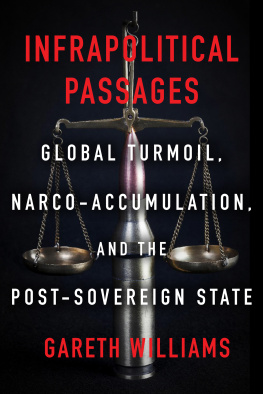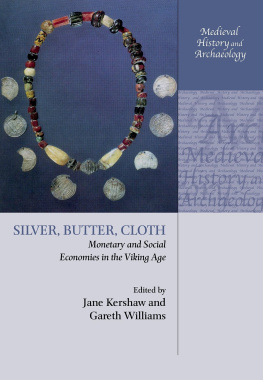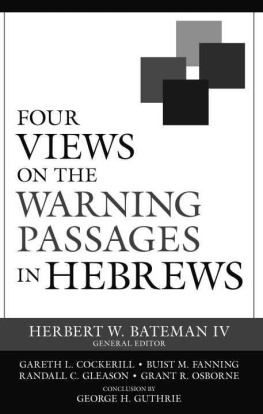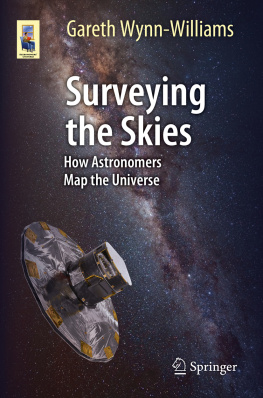Gareth Williams - Infrapolitical Passages
Here you can read online Gareth Williams - Infrapolitical Passages full text of the book (entire story) in english for free. Download pdf and epub, get meaning, cover and reviews about this ebook. year: 2020, publisher: Lightning Source Inc. (Tier 2), genre: Politics. Description of the work, (preface) as well as reviews are available. Best literature library LitArk.com created for fans of good reading and offers a wide selection of genres:
Romance novel
Science fiction
Adventure
Detective
Science
History
Home and family
Prose
Art
Politics
Computer
Non-fiction
Religion
Business
Children
Humor
Choose a favorite category and find really read worthwhile books. Enjoy immersion in the world of imagination, feel the emotions of the characters or learn something new for yourself, make an fascinating discovery.
- Book:Infrapolitical Passages
- Author:
- Publisher:Lightning Source Inc. (Tier 2)
- Genre:
- Year:2020
- Rating:5 / 5
- Favourites:Add to favourites
- Your mark:
- 100
- 1
- 2
- 3
- 4
- 5
Infrapolitical Passages: summary, description and annotation
We offer to read an annotation, description, summary or preface (depends on what the author of the book "Infrapolitical Passages" wrote himself). If you haven't found the necessary information about the book — write in the comments, we will try to find it.
Infrapolitical Passages — read online for free the complete book (whole text) full work
Below is the text of the book, divided by pages. System saving the place of the last page read, allows you to conveniently read the book "Infrapolitical Passages" online for free, without having to search again every time where you left off. Put a bookmark, and you can go to the page where you finished reading at any time.
Font size:
Interval:
Bookmark:

INFRAPOLITICAL PASSAGES
| Infrapolitical Passages GLOBAL TURMOIL, NARCO-ACCUMULATION, AND THE POST-SOVEREIGN STATE |
Gareth Williams
FORDHAM UNIVERSITY PRESSNEW YORK 2021
Copyright 2021 Fordham University Press
All rights reserved. No part of this publication may be reproduced, stored in a retrieval system, or transmitted in any form or by any meanselectronic, mechanical, photocopy, recording, or any otherexcept for brief quotations in printed reviews, without the prior permission of the publisher.
Fordham University Press has no responsibility for the persistence or accuracy of URLs for external or third-party Internet websites referred to in this publication and does not guarantee that any content on such websites is, or will remain, accurate or appropriate.
Fordham University Press also publishes its books in a variety of electronic formats. Some content that appears in print may not be available in electronic books.
Visit us online at www.fordhampress.com.
Library of Congress Control Number: 2020919022.
Printed in the United States of America
23 22 215 4 3 2 1
First edition
for Elena and Carlos, because we laugh for Cristina, for everything since October 1986
Contents
And they did build vast trophies, instruments
Of murder, human bones, barbaric gold,
Skins torn from living men, and towers of skulls
With sightless holes gazing on blinder heaven,
Mitres, and crowns, and brazen chariots stained
With blood, and scrolls of mystic wickedness,
The sanguine codes of venerable crime.
PERCY BYSSHE SHELLEY
Turning and turning in the widening gyre
The falcon cannot hear the falconer;
Things fall apart; the centre cannot hold;
Mere anarchy is loosed upon the world,
The blood-dimmed tide is loosed, and everywhere
The ceremony of innocence is drowned;
The best lack all conviction, while the worst
Are full of passionate intensity.
W. B. YEATS
But the new barbarian is no uncouth
Desert-dweller; he does not emerge
From fir forests; factories bred him;
Corporate companies, college towns
Mothered his mind, and many journals
Backed his beliefs.
W. H. AUDEN
To think is to linger on the conditions in which one is living, to linger
on the site where we live. Thus to think is a privilege of that epoch
which is ours, provided that the essential fragility of the sovereign
referents becomes evident to it. This assigns to philosophy, or to
whatever takes its place, the task of showing the tragic condition
beneath all principled constructions.
REINER SCHRMANN
New ears for the new music. New eyes for the most distant things.
FRIEDRICH NIETZSCHE
 | Exordium Extinction and Everyday Infrapolitics |
Did you hear what I just said? Is my English OK? Is the microphone on? Because Im beginning to wonder.
GRETA THUNBERG, YOU DID NOT ACT IN TIME
This book proposes to clear a way through some of the dominant conceptual determinations and violent symptoms of globalization, to make a case for the infrapolitical as a thinking and acting to come. For this reason, while still at a preliminary detachment from the principal corpus of this work, I begin by offering the reader a brief illustration of the innermost relation between infrapolitics and the everyday language of contemporary turmoil, anxiety, and disquiet. The Introduction that ensues from this exordium will then offer a more comprehensive account of recent debates around the importance and relevance of infrapolitical thinking for our times.
What follows, then, is merely one initial example among countless others, since the infrapolitical only ever registers and strives to account for the most quotidian of sayings and experiences, while doing so in their most uncanny proximity and estrangement. The preliminary illustration of the contemporary infrapolitical, then, is the following.
In the context of the Extinction Rebellion, which occupied and disrupted the streets of central London for more than a week in April 2019, the then sixteen-year-old Greta Thunberg stood in public before a microphone, admonished the political classes for having failed, and wondered out loud whether she was isolated in public, speaking in the absence of all interlocution, or whether her words actually touched upon a commonality of some sort, thereby staging the very question of the proximity to, and of the distance from,
In Thunbergs public interventions the politics of contemporary global capital is portrayed as a race to the bottom of reason itself, played out in the wake of the subordination of all thinking and living to the economized relation between means and ends, a relation that, thanks to the overall mastery of contemporary technicity, has brought humanity and the planet to the threshold of potential existential collapse. We can discern that for the young Swede political, economic, technological, and historical business as usual merely serves to conceal the underlying and ongoing question of existence and, as such, of Being.
In order to get the point across that what is needed is a passage toward alternative ways of thinking and acting, Thunberg renders the previously inconspicuous conspicuous by placing the routine political calculations internal to capitalism in another light, reconverting the familiarity and ordinariness of home, for example, into the unfamiliar ground of an existential conflagration: I dont want your hope. I want you to panic. I want you to act as if the house is on fire, because it is, as she said at Davos in January 2019. The simplicity of her formulations indicates a potentially complex hermeneutic operation: She simultaneously upholds a figurative order of experience (I want you to act as if the house is on fire) and immediately destroys the legitimacy of the figuration itself (because it is), thereby imploring that the political classes quit storytelling and get real for once. She overturns the apparently commonplace and the insignificant (the signifier house) by daring to place the question of extinctionand therefore of finitude and deathat the heart of contemporary concerns. Thunberg does not address such ontological questions explicitly. Rather, they are implicit in her overall concern as part and parcel of everything she communicates at such moments. They are at the heart of the distress she voices as she unveils the political, or at least the neoliberal politics of global resource extraction extended in the name of accumulation at all costs, as the only form of life available to humanity, as the active concealment and oblivion of all fundamental existential concerns.
Of course, entire communities throughout the world have been saying exactly the same thing for decades but were never allowed access to Davos or central London. But that is a slightly different, though no less significant, question. What is noteworthy for us now is that through Thunbergs perception, language, and persona we encounter the two intertwined registers not of the political but of what precedes and underlies it, namely, the infrapolitical. The first register is sociological and everyday (or ontic). But this everyday is also precisely the place where the second register is posited and, in its positing, breached from within, uncovering in the process an
Next pageFont size:
Interval:
Bookmark:
Similar books «Infrapolitical Passages»
Look at similar books to Infrapolitical Passages. We have selected literature similar in name and meaning in the hope of providing readers with more options to find new, interesting, not yet read works.
Discussion, reviews of the book Infrapolitical Passages and just readers' own opinions. Leave your comments, write what you think about the work, its meaning or the main characters. Specify what exactly you liked and what you didn't like, and why you think so.














